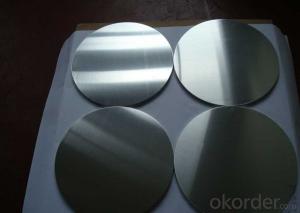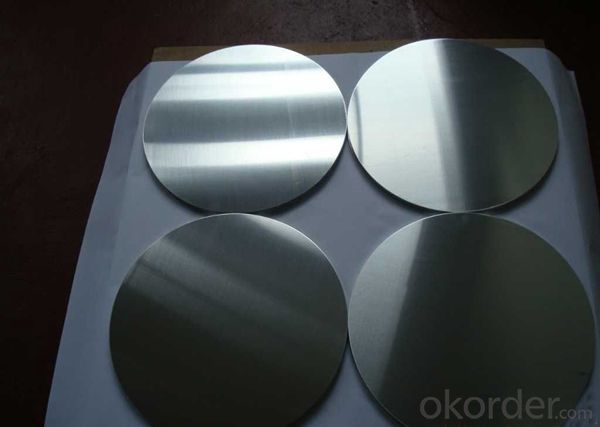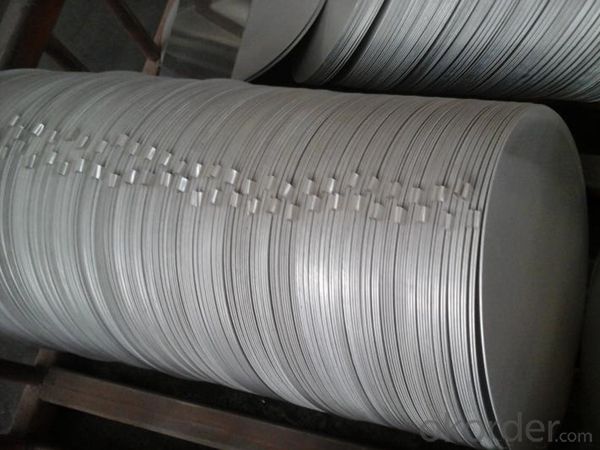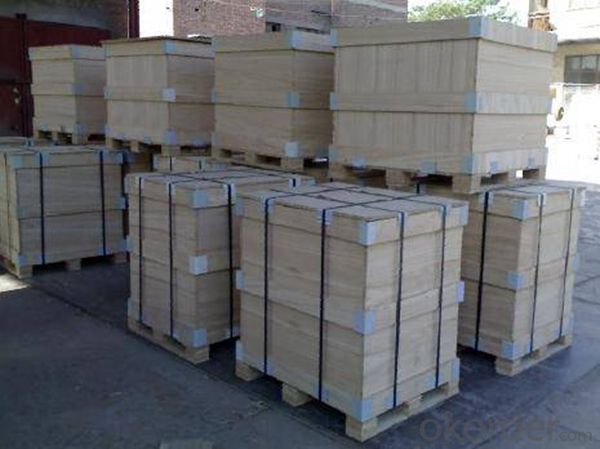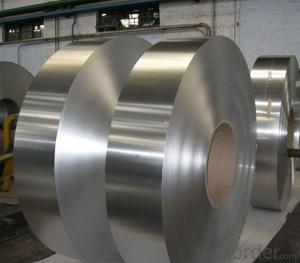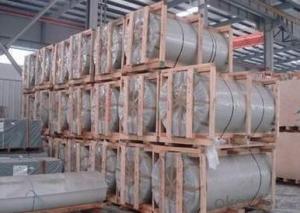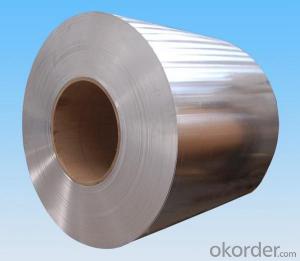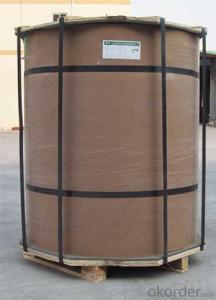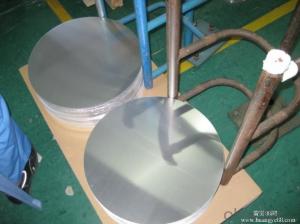Customized Color Aluminum Coated Coil - EN AW-1050A Mill Finished CC Aluminium Circle
- Loading Port:
- Shanghai
- Payment Terms:
- TT OR LC
- Min Order Qty:
- 5 m.t.
- Supply Capability:
- 2000 m.t./month
OKorder Service Pledge
OKorder Financial Service
You Might Also Like
Specification
1. Structure of EN AW- 1050A Mill Finished CC Aluminium Circle Description
EN AW- 1050A Mill Finished CC Aluminium Circle is one semi-finished aluminium material. The alloy AA1050 is widly used in building, industry ect. Its weight is much lower than steel. So many customers choosed aluminium material instead of steel.
2. Specification of EN AW- 1050A Mill Finished CC Aluminium Circle
EN AW- 1050A Mill Finished CC Aluminium Circle | |
Main Specification | |
Alloy | AA1xxx (AA1050, AA1060, AA1070, AA1100 etc.) |
AA3xxx (AA3003, AA3004, AA3005, AA3105 etc.) | |
AA5xxx, AA6XXX (AA5052,AA5083, AA5754, AA6061, AA6062 etc.) | |
AA8xxx(AA8011, AA8006 etc.) | |
Temper | H14,H16, H18, H22, H24, H26, H32,O/F, T4, T6, T651 |
Thickmess | 0.01mm-100mm |
Width | 30mm-1700mm |
Standard | GB/T 3880-2006/ASTM |
Special specification is available on customer's requirement | |
3. Application of EN AW- 1050A Mill Finished CC Aluminium Circle
(1).Interior: wall cladding, ceilings, bathrooms, kitchens and balconies, shutters, doors...
(2).Exterior: wall cladding, facades, roofing, canopies, tunnels,column covers , renovations...
(3).Advertisement: display platforms, signboards, fascia, shop fronts...
4. Feature of EN AW- 1050A Mill Finished CC Aluminium Circle
Surfact Quality :
Be free from Oil Stain, Dent, Inclusion, Scratches, Stain, Oxide Dicoloration, Breaks, Corrosion, Roll Marks, Dirt Streaks and other defect which will interfere with use,
Mechenical Property:
Chemical Composite and Mechanical Property
5. Certificate of EN AW- 1050A Mill Finished CC Aluminium Circle
SGS and ROHS(if client request, paid by client), MTC(plant provided), Certificate of Origin(FORM A, FORM E, CO), Bureau Veritas and SGS (if client request, paid by client), CIQS certificate
6. Image of EN AW- 1050A Mill Finished CC Aluminium Circle
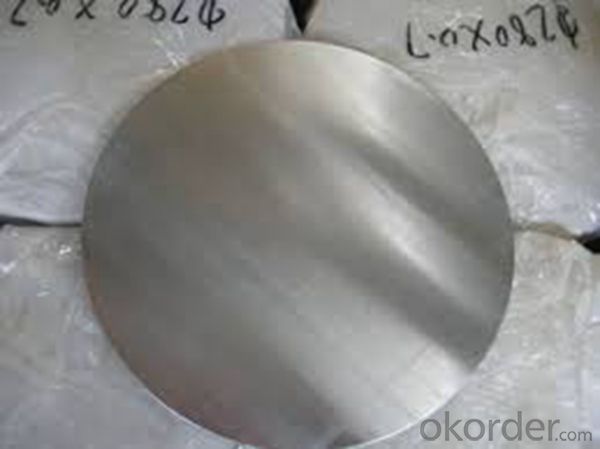
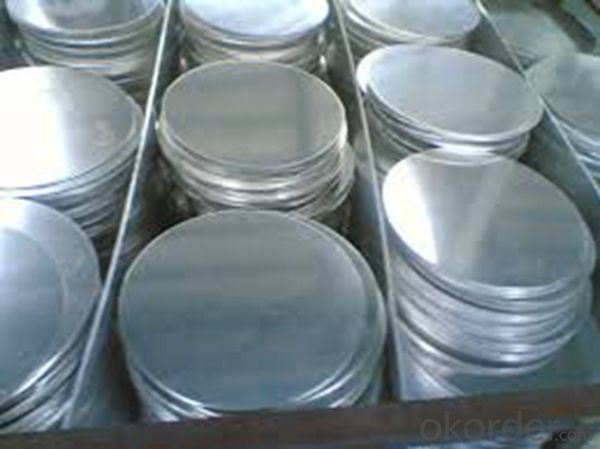
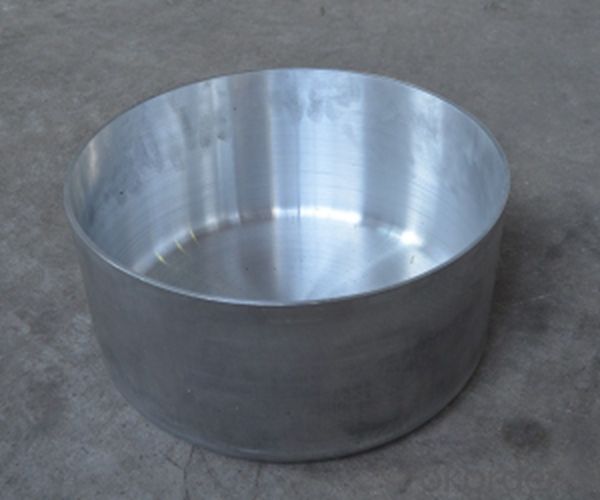
7. Package and shipping of EN AW- 1050A Mill Finished CC Aluminium Circle
First, plastic cloth with drying agent inside; Second, Pearl Wool ; Third, wooden cases with dry agent , fumigation wooden pallets, aluminum surface could cover blue PVC film
8. FAQ
1) What is the delivery time?
Depends on actual order, around 20 to 35 days
2) What is the QC system:
We have QC staff of 20 persons and advanced equipment, each production is with MTC traced from Aluminum ingot lot.
3) What market do you mainly sell to?
Australia, America, Asia, Middle East, Western Europe, Africa etc
- Q: Are aluminum coils resistant to UV radiation?
- Generally, aluminum coils have resistance to UV radiation. Aluminum is a material known for its high durability and resistance to corrosion. It possesses innate properties that shield it from the harmful impacts of UV radiation. Unlike some other metals, aluminum does not undergo oxidation or deterioration when exposed to sunlight over long durations. This characteristic renders it an excellent option for applications that involve UV exposure, including outdoor structures, solar panels, and automotive components. Nonetheless, it is crucial to acknowledge that although aluminum can withstand UV radiation, it may still experience degradation if not adequately protected or maintained.
- Q: How do aluminum coils contribute to sustainable manufacturing practices?
- The numerous environmental and economic benefits of aluminum coils make them crucial for promoting sustainable manufacturing practices. To start, aluminum is an incredibly recyclable material, with almost 75% of all aluminum ever produced still in use today. This means that aluminum coils can be recycled and reused multiple times without losing their quality or performance. Unlike producing new aluminum, recycling aluminum requires only a fraction of the energy, resulting in significant energy savings and reduced greenhouse gas emissions. Furthermore, the lightweight nature of aluminum coils contributes to energy efficiency in transportation and reduces fuel consumption during shipping. This characteristic allows for more efficient use of resources, as less material is needed to achieve the same strength and durability compared to other metals. Consequently, this not only reduces the overall weight of products but also lowers the energy required for their fabrication and transportation. Moreover, the excellent corrosion resistance of aluminum coils extends their lifespan and reduces the need for frequent replacement. This factor not only saves resources but also reduces waste generation and associated environmental impacts. Additionally, aluminum coils are non-toxic and do not release harmful substances into the environment, making them a safe and sustainable choice for various manufacturing applications. In terms of economic benefits, aluminum coils contribute to sustainable manufacturing practices by offering cost savings throughout their lifecycle. The recyclability of aluminum reduces the need for raw material extraction, thereby lowering operational costs and dependence on virgin resources. Additionally, the lightweight nature of aluminum coils allows for more efficient use of energy and resources, resulting in reduced manufacturing and transportation costs. In conclusion, aluminum coils are essential for promoting sustainable manufacturing practices due to their recyclability, lightweight nature, corrosion resistance, non-toxicity, and cost-saving benefits. By integrating aluminum coils into manufacturing processes, companies can reduce their environmental footprint, conserve resources, promote energy efficiency, and contribute to a more sustainable and greener future.
- Q: What are the common surface treatments applied to aluminum coils?
- The common surface treatments applied to aluminum coils include anodizing, painting, and powder coating.
- Q: What types of aluminum coils are there that are designed for particular applications?
- <p>Yes, there are various types of aluminum coils designed for specific purposes. For instance, there are coils for construction, which are often used for roofing and siding. Coils for automotive applications are used in manufacturing car parts. Reflective coils are ideal for heat reflection in industries like food processing. Coils for electrical applications are used in transformers and wiring. Each type has specific properties like thickness, strength, and surface finish tailored to meet the requirements of their respective industries.</p>
- Q: Is it safe and appropriate to use aluminum coils for food packaging?
- <p>Yes, aluminum coils can be used for food packaging. Aluminum is a common material in the food packaging industry due to its lightweight, durability, and excellent barrier properties against light, oxygen, and moisture. It is widely used in the production of flexible packaging, such as pouches, laminates, and foils. However, it's important to ensure that the aluminum coils meet food-grade standards and are used in accordance with food safety regulations to prevent any contamination or health risks.</p>
- Q: What are the different coil widths available for aluminum coils?
- The different coil widths available for aluminum coils can vary depending on the specific requirements and applications. However, common coil widths for aluminum coils range from as narrow as 1 inch (2.54 cm) to as wide as 72 inches (182.88 cm) or even wider in some cases.
- Q: How are aluminum coils tested for quality and performance?
- Aluminum coils are tested for quality and performance through various methods including visual inspections, dimensional measurements, mechanical property testing, and corrosion resistance testing. These tests help ensure that the coils meet specific standards and requirements for their intended applications.
- Q: Can aluminum coils be used in corrosive environments?
- No, aluminum coils should not be used in corrosive environments. Aluminum is susceptible to corrosion, especially in the presence of certain chemicals or salts. Therefore, it is recommended to use a more corrosion-resistant material, such as stainless steel, in such environments.
- Q: Can aluminum coils be used for solar panel installations?
- Indeed, solar panel installations can utilize aluminum coils. Aluminum, renowned for its lightweight nature, durability, and corrosion resistance, is frequently employed within the solar industry. As framing materials for solar panel mounting, aluminum coils furnish a robust and enduring support structure. Moreover, they boast exceptional heat dissipation properties, crucial for optimizing solar panel efficiency. Notably, aluminum coils are also user-friendly, rendering the installation process more convenient. All in all, opting for aluminum coils in solar panel installations proves to be a widely favored and efficient decision.
- Q: What is the role of aluminum coils in the construction of railways?
- Aluminum coils are used in the construction of railways for various purposes, primarily for the manufacturing of overhead lines and electrical conductors. Due to their high conductivity, lightweight nature, and corrosion resistance, aluminum coils are ideal for transmitting electrical power and ensuring efficient and reliable railway operations. These coils are also utilized in the production of railway carriages and components, providing strength and durability while reducing overall weight, which ultimately improves fuel efficiency and lowers operating costs. Overall, aluminum coils play a crucial role in enhancing the performance, safety, and sustainability of railway systems.
Send your message to us
Customized Color Aluminum Coated Coil - EN AW-1050A Mill Finished CC Aluminium Circle
- Loading Port:
- Shanghai
- Payment Terms:
- TT OR LC
- Min Order Qty:
- 5 m.t.
- Supply Capability:
- 2000 m.t./month
OKorder Service Pledge
OKorder Financial Service
Similar products
Hot products
Hot Searches
Related keywords
